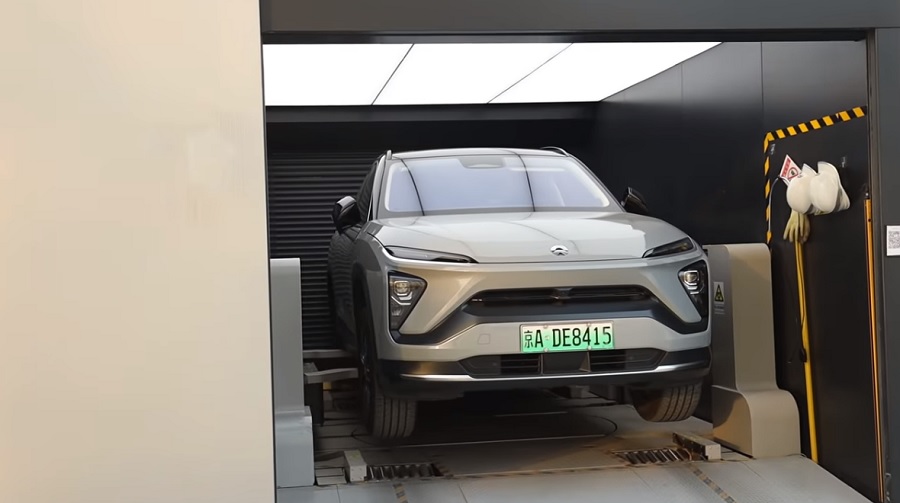In addition to Tesla, there is another manufacturer of electric cars on the US stock exchange Nasdaq: the Chinese company Nio, founded in 2014, which already has two chic E-SUVs on its home market and will also deliver a crossover similar to the Tesla Model Y with the EC6 in 2020. With a market cap of just under $6 billion, Nio is tiny compared to Tesla. Nevertheless, the company takes care of its own charging infrastructure as Tesla did early on – but in its own way.

Faster than the Tesla Supercharger
Because Nio operates a fast charging network for its electric cars like the Tesla superchargers since the end of 2017. Charged batteries are kept there for Nio owners who arrive with an empty battery. As shown in a video from Beijing published in late 2019, the whole procedure only takes about 5 minutes and is fully automated. Nio announced at the end of May, they swapped more than 500,000 batteries at its 131 exchange stations in China.
A charging process on a supercharger is not possible in such short time even with a Tesla Model 3 at a fast V3 station with up to 250 kilowatts. A good 20 minutes are required, and the luxury electric cars Model S and Model X take even longer due to their larger batteries and lower charging power.
So the time advantage of swapping instead of loading is obvious, but nevertheless with Better Place Project from Israel, an initially celebrated company that wanted to grow big with this concept failed early on. Tesla also built a battery-changing station in 2014, which caused a sensation at the time. A patent publication followed in 2016, but Tesla only pushed ahead with the supercharger expansion, and nothing has been heard from exchanges since then.
Batteries can also be rented from Nio
The plans for battery swap were announced in December 2017, the first station opened in Shenzhen in May 2018, and the 131 units currently in progress are far from over; According to supercharge.info, Tesla currently operates 281 Supercharger stations in China. One of the points that bothered some with the exchange concept is the fact that you always get a different battery, possibly in worse condition than the previous or your own. Nio counteracts this by offering the batteries for rent, unlike Tesla, but similar to Renault, for example.










This becomes a complex problem with several vehicle variants because you have to operate several standard battery sizes or the car always has to build around one battery, which does not allow smaller or narrower cars or wastes space in large cars.
Better Place has failed in Israel despite government support as far as I know. Maybe there will be more success in China. It really only makes sense if the batteries are standardized across many vehicle types, brands and generations. Imagine each car brand using different fuel.
it only really makes sense from the manufacturer’s point of view – because of course it’s a perfectly closed ecosystem.
Unimaginable for cars because of the variety and rapid development. Let’s say cautiously: at the moment and in the foreseeable future, that they use this method. Maybe for large vans in shuttle traffic. But here the complete tractors would probably be replaced rather than having to store batteries. Or another approach: Batteries are kept, to which wheels are then screwed. But why this extra effort? Faster charging technology is needed. Twice as fast and in larger numbers would be good. It’s not that far anymore.